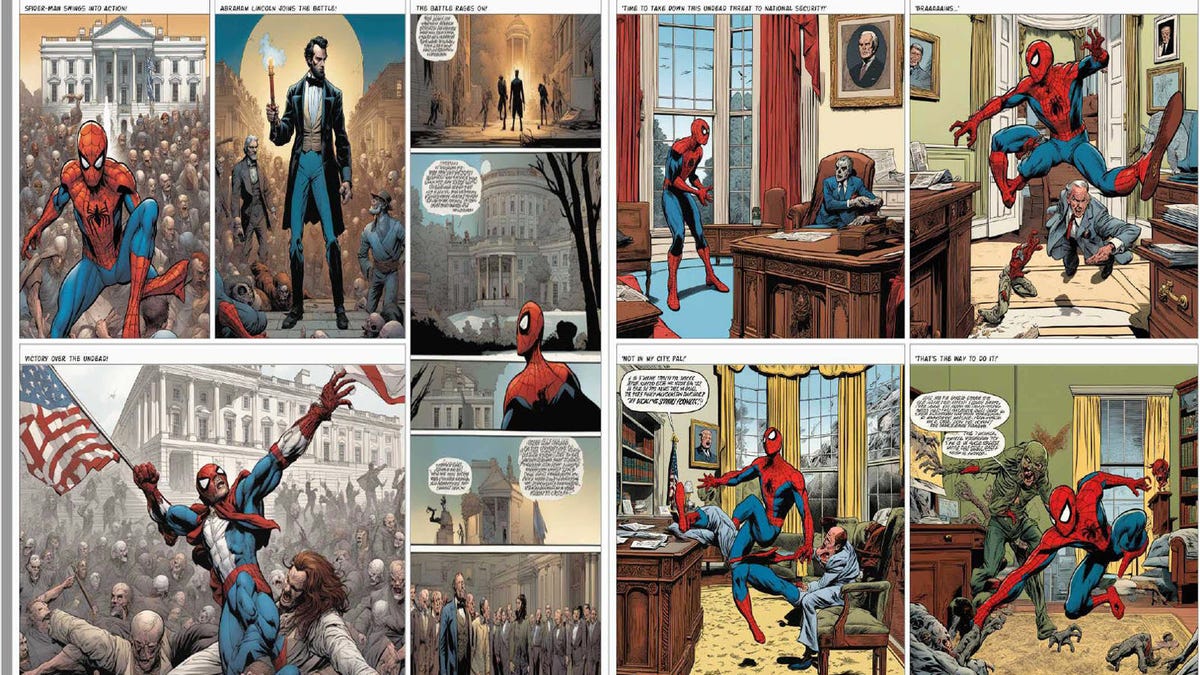- AIdeations
- Posts
- AI's Brave New World: Politics, Meta's Challenge, and the Human Impact
AI's Brave New World: Politics, Meta's Challenge, and the Human Impact
From Political Chatbots and Meta's Ambitions to Amazon's Groundbreaking Policy—Discover How AI is Transforming Our Lives and What You Should Be Watching Out For.


Welcome to Aideations. Your no BS, most comprehensive daily guide to AI. Thanks for continuing to make this newsletter your trusted resource and sharing it with others. Today, I’m working in Destin, FL helping a resort upskill their employees on generative AI tools like ChatGPT. It’s a 2-day boot camp and I can’t wait to share what we learn over the next two days.
Coming in HOT this morning with an 8:30AM edition instead of my usual 12:30 EST.
Today we're digging deep into the rapidly changing AI landscape. First up, we explore how AI chatbots like Chat2024 are increasingly influencing politics and why we need to tread carefully. Next, we evaluate Meta's audacious attempt to rival GPT-4 and what it means for the AI industry. Amazon shakes up the publishing game with new rules for AI-authored books. Finally, FOBO (Fear of Becoming Obsolete) is taking a toll on the American workforce, and AI is a significant factor. Strap in; it’s a week of game-changers!
📰 News From The Front Lines
📖 Tutorial Of The Day
🔬 Research Of The Day
📼 Video Of The Day
🛠️ 6 Fresh AI Tools
🤌 Prompt Of The Day
🐥 Tweet Of The Day
Political Chatbots Are Here and They're Almost Too Real: How AI is Shaking Up Elections and Why We Should Be Worried

cartoon image of Donald Trump texting on a cell phone, style of charicature, political cartoon --ar 16:9 --v 5.2
Hold onto your voting booths, folks, because AI is stomping into politics like a teenager into Hot Topic—edgy and loaded with angst. First, we had AI versions of Joe Biden and Donald Trump engaging in trash talk marathons on Twitch—like a pair of robotic WWE fighters with a political agenda. But that was just the overture.
Enter Chat2024, Silicon Valley's latest brainchild, and Dara Ladjevardian's PR-stunt-turned-holy-grail for his AI startup Delphi. They've unleashed 17 AI chatbot politicians, all programmed with enough data to rival the Library of Congress. These bots could debate against each other, answer user queries, and even rehash the same political talking points until you're blue (or red) in the face.
Now, I'm all for innovation. Heck, my whole biz thrives on using AI to push boundaries. But here's where I get antsy: disclosure, disclosure, disclosure. Anyone dabbling in politics with AI needs a "Handle With Care" sticker slapped onto their foreheads. Because we've seen how technology can manipulate minds, thanks to Cambridge Analytica's dinner party invites in previous elections. Can you imagine voters having "heart-to-hearts" with AI-generated politicians and not knowing they're artificial? Or the amount of disinformation spread in political ads using AI-generated videos and images? Well, the fact is it’s already happening, and unless we do something, it will only get worse.
Dara envisions this as the future, arguing it's a more engaging way for voters to connect with candidates. Inspired by his mom's failed congressional bid, he believes chatbots could fill the gap where traditional media falls short. He's also betting on campaigns using the bots to collect data on voter opinions. Call me skeptical, but public opinion is tricky business, my friends. Imagine running a country based on Twitter trends; it'd be like riding a rollercoaster designed by a toddler.
Chat2024 isn't a dystopian sci-fi flick—yet. The bots can parrot candidates quite well, from Cornel West's poetic rhetoric to Desantis' war cries against "wokeness." But they're still miles away from fooling anyone. They're text-and-voice-only, and they sound about as natural as me trying to rap.
At the end of the day, the line between AI chatbots and human politicians might blur faster than we'd like to think. So, let's not wander blindly into this brave new world. Any political ad using AI needs to be flagged, with hefty fines for those who think they can play fast and loose. Otherwise, we're heading for a future of mistrust that would make Orwell’s 1984 look like a children's bedtime story.
Until next time, keep it real—emphasis on the real.

Is Meta's New AI Model the GPT-4 Slayer or Just a Copycat? Inside the High-Stakes Showdown That Could Change the Future of Tech!

Mark Zuckerberg, the founder of Facebook, standing in a futuristic room filled with computer servers. The room is bathed in vibrant, colorful lights, creating a mesmerizing spectacle. The servers are arranged in a geometric pattern, extending into the distance, emphasizing the immense scale of the technology. Mark Zuckerberg is depicted wearing a casual yet futuristic outfit, reflecting his role as a pioneer in the tech industry. The image should exude a sense of energy and innovation. The overall style should be hyper-realistic, with highly detailed server racks and intricate lighting effects. The resolution should be set to 16k, ensuring every detail is captured with precision. --ar 16:9
Hey, you know that scene in every action movie where the villain says, "This isn't even my final form?" That's basically what Meta is trying to say to OpenAI right now. Word on the Silicon Valley streets is that Meta (you know, the new fancy name for Facebook's parent company) is cooking up an AI model that aims to be as monstrous as OpenAI's GPT-4. Oh, and they're going at it alone, not even collaborating with Microsoft like they did with their cutesy "Llama 2" model.
Why should we care? Well, Mark Zuckerberg has assembled a sort of "Avengers for AI," aiming to supercharge generative AI tools. Generative AI is the same wizardry that powers language models like ChatGPT and can produce text that's indistinguishable from something a human might write. The plan is to have this behemoth trained and ready to roll by 2024.
Now let's talk brass tacks and strategy. While the AI industry is feeling like the Wild West these days—with everyone from Amazon to your tech-savvy grandma having opinions on business models and regulations—Zuck wants Meta to wear the sheriff's badge. They're putting all their chips (literally, they're hoarding Nvidia's H100s like they're going out of style) on building this model in-house.
Before you get too excited, keep this in mind: size isn't everything. At least, that's what some AI researchers would like us to believe. OpenAI's GPT-4 runs on a jaw-dropping 1.5 trillion parameters, but some say smaller models can be almost as effective. But let's get real—no one ever made headlines by being "almost as good." Meta is playing catch-up, and it's not just a game of numbers. In the world of AI, it's often the early bird that catches the most lucrative worms.
I'll give Meta credit for one thing—they're planning to open-source this AI Godzilla. That means other companies could freely build upon it. Imagine a universe where AI isn't just a luxury for tech giants but a tool accessible for all. Sounds pretty good, right? But hold on, there's a flip side. Open sourcing a model this powerful could mean a new level of disinformation, or worse. Even Meta's own lawyers are sweating about the potential risks.
So, where does this put Meta in the AI arms race? Their open-source approach offers some solid perks—adaptability, lower costs, and a broader user base. But they're still gunning for a target that's moving fast, with OpenAI already being the go-to for generative text and even Google cooking up its own AI model, Gemini. If you ask me, Meta's got a steep mountain to climb. They might be planning to release something as powerful as GPT-4, but from where I stand, they're still playing catch-up.
Now for the kicker: Want to take a wild guess who's meeting up to chat about the future of AI? Yep, Zuckerberg, OpenAI's Sam Altman, and Google's Sundar Pichai. Let's hope that meeting has more fireworks than a Fourth of July barbecue. Because with AI, the stakes are high, the players are big, and no one wants to be left in the dust.

Amazon Just Changed the Game for AI-Written Books: Here's What It Means for Authors and Readers!

Picture this: You're a budding author, and instead of hiring an editor, you employ a clever AI tool to spit-shine your manuscript. Or heck, maybe you even let the AI write the whole book for you—sort of an AI ghostwriter, if you will. Amazon's latest policy update says you're cool to do that, but hold your horses—there are rules.
Here's the skinny: Amazon's Kindle Direct Publishing just updated its guidelines to draw a line between "AI-generated" and "AI-assisted" content. If your AI buddy wrote your book, you've gotta disclose it. You know, honesty is the best policy and all that. But if you're just using AI to polish your text, edit, or brainstorm, then you're in the clear; no need to tell anyone you've got a robot in your creative corner.
Amazon's move, while a tad bureaucratic, is a nod to the disruptive effect of generative AI technologies like ChatGPT. And the Authors Guild? They're giving it two thumbs up, calling it a "welcome first step." They've been on about this for months, worried that human authors could be overshadowed by literary robots.
Now, the initial impact may be limited. Amazon isn't slapping "AI-Generated" stickers on book covers or anything (although wouldn't that be something?). They're keeping their options open, which means they might ramp up these regulations in the future.
This is a logical move against misinformation. Look, I'm all for AI helping me out, but I've got beef with non-disclosure. You think spam calls are annoying? Just wait until AI voicebots become indistinguishable from humans. Talk about Blade Runner vibes. Transparency isn't just nice to have; it's a must. And when it comes to things like deepfake political ads or AI-generated spam calls, it's high time for some good ol' fashioned regulation. Until then, just know that the next Kindle bestseller might've been written by an algorithm, not a starving artist in a coffee shop. Makes you think, doesn't it?

Why 22% of American Workers Are Losing Sleep Over FOBO—And Why You Should Be Paying Attention!

Fear of Being Obsolete --ar 16:9 --v 5.2
Ah, job security. The Holy Grail of the work life. One minute you're sipping that artisanal cold brew, feeling indispensable in your ergonomic office chair, and the next, you’re staring down a Gallup poll that’s basically a doom-scroll through your career.
Let's talk about FOBO—Fear of Becoming Obsolete. According to Gallup, the number of U.S. workers getting night sweats about tech phasing them out has grown more in the last two years than ever since 2017. Now, 22% are on edge, which is a leap from the measly 13-17% range we were chilling at earlier.
Here’s the twist: It’s the college-educated folks whose worry meters have spiked from 8% to a solid 20%. Remember when a degree was supposed to be your golden ticket to career longevity? Well, apparently not. Meanwhile, the non-degree folks are pretty consistent with their worries at 24%, making both groups equally scared of their spreadsheets coming to life and taking their jobs.
Why the change? Let’s bring generative AI into the mix. Ever since ChatGPT made its grand entrance last November, it's like we broke the glass ceiling on what computers could do. Forget robots lifting boxes in warehouses; we're talking algorithms that can write code and possibly pen the next great American novel.
But hold on, if you think tech takeover is the only thing haunting workers, you're missing half the drama. Their biggest worry isn't Skynet; it's losing benefits (31% are concerned). Lower wages? Another 24% are sweating about it. So while tech anxiety is growing, the good old fears of wage cuts and pink slips haven't packed their bags yet.
I'm all in for AI, but I also know it's no magic wand. Employers and employees need to pull up their bootstraps. Upskill, reskill, and maybe even side-skill. Generative AI tools like ChatGPT can be invaluable allies, not just existential threats. The trendy statement I keep hearing is, "AI isn't coming to replace you, someone using AI will replace you." Amen to that! Don't just sit there; become that 'someone.'
We're in the driver's seat of technology; let's not turn into passive passengers. After all, if AI can learn to write code and compose music, we can surely learn to use it to our advantage. Now go and make sure your job description includes "proficient in not becoming obsolete."


Free Iphone ChatGPT Hack to 10x Your Productivity


Authors: Runsen Xu, Xiaolong Wang, Tai Wang, Yilun Chen, Jiangmiao Pang, Dahua Lin
Executive Summary:
The research paper presents PointLLM, a novel multi-modal large language model designed to understand colored point clouds. Point clouds are sets of data points in space, commonly used in 3D modeling. Unlike traditional models that struggle with depth perception, occlusion, and viewpoint dependency, PointLLM leverages its capabilities to accurately perceive object types, geometric structures, and appearances. The model responds efficiently to user instructions, demonstrating its capability to offer insights that are usually hard to acquire from regular 2D images.
Pros:
1. Multi-Modal Understanding: PointLLM can understand both text and point clouds, broadening its application scope.
2. Depth and Occlusion Handling: The model excels in scenarios where traditional models falter, such as handling depth and occlusion.
3. Versatility: The model can be applied to various use-cases ranging from 3D modeling to virtual reality.
Limitations:
1. Computational Intensity: The model requires significant computational power, making it less accessible for small-scale applications.
2. Data Dependency: High-quality point cloud data is essential for optimal performance, which could be a limitation in data-scarce environments.
Use Cases:
1. 3D Modeling: PointLLM can be invaluable in creating accurate 3D models for architecture, engineering, and video games.
2. Virtual Reality: The model's ability to understand spatial data makes it suitable for immersive virtual reality experiences.
3. Robotics and Automation: Robots equipped with PointLLM can better navigate and interact with their environments.


Pika - A powerful Text-to-Video platform that can unleash your creativity simply by typing.
MovieBot - Make hilarious 3D animation with AI.
Beatoven - Makes it easy for content creators to generate background music with the help of AI
FlowGPT - Find and use great prompts.
Essay Builder - Free AI-powered tool that helps you to generate top-notch essays in seconds.
Castly - Transform Ideas into Content in Seconds.

Business Strategist:
Act as a business strategist.
Design an offer stack of services that solve the same problem for my customer
My customers main problems are [problem areas]
My core offer is [copy/paste service]
Design a low cost entry point service and a high cost premium service to complement this core offer.
The entry point should be highly scalable. The premium should not be scalable.
Design my service offer stack from entry point to core to premium so that I can move customers from level to level.
This audio of Elon Musk is 100% fake.
I generated it with AI in <5min.
We’re entering an era where what you see and what you hear aren’t always real.
Society needs to begin putting its guard up on AI-generated disinformation.
— Mckay Wrigley (@mckaywrigley)
1:56 PM • Sep 11, 2023





